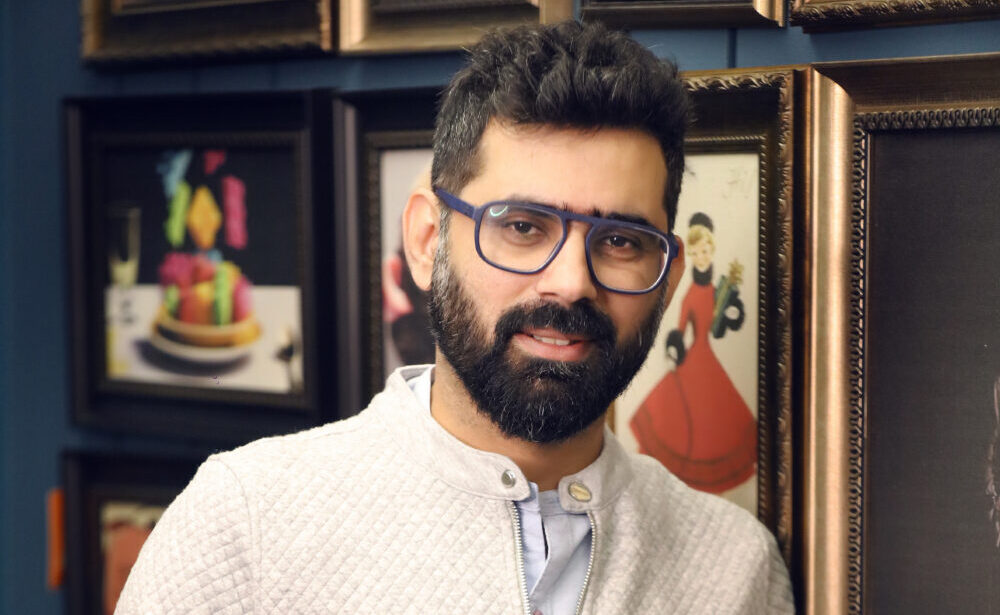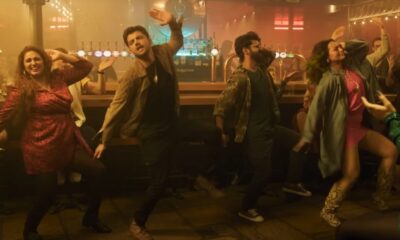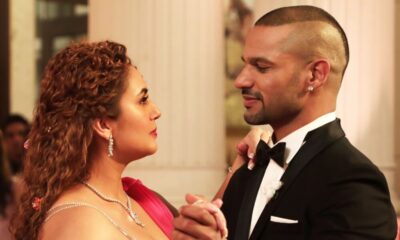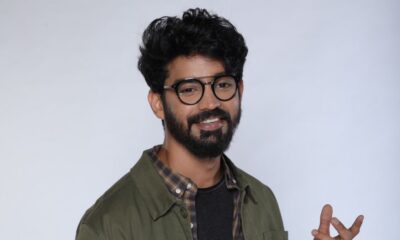Exclusives
Double XL director Satramm Ramani opens up about his filmmaking journey
Satramm Ramani, who made his directorial debut with Helmet (2021), is gearing up for the release of his second feature Double XL, starring Sonakshi Sinha and Huma Qureshi.
Published
1 year agoon

Satramm Ramani, who made his directorial debut with Helmet (2021), is gearing up for the release of his second feature Double XL, starring Sonakshi Sinha and Huma Qureshi. In a candid conversation with Cine Blitz, Ramani goes down memory lane and reminisces about falling in love with the movies, and his professional journey so far.
When did you fall in love with the movies?
Inherently, two factors drove me here. Firstly, I come from a Sindhi family. So, we were into business. But my father always had an inclination towards theatre. He would take me to see Marathi plays. He would also write plays sometimes. I was fascinated by the Marathi plays that I saw. One of my favourites was Babasaheb Purandare’s Jaanata Raja. The play used to be on a tour and would come to our town once in two years. I watched it 3-4 times at least. It was a huge play where 150 artists performed live with real animals and whatnot. I was fascinated by that creation. At that time, the fencing used to be made from bamboo sticks. I would climb and sneak in to get the front seats. It’s sad that the show has been discontinued. It’s very important for the next generations to see it.
As for cinema, I was a huge Shah Rukh Khan fan and I wanted to watch films on the first day first show. But my pocket money was minimum. So, I used to give five rupees to the gatekeeper so that he wouldn’t charge me for the tickets. He used to allow me to sit on the stairs and watch movies. I would live that character for four-five days. Such was the craze. Going to the cinemas was a huge thing and as I was living those experiences, I think the creator in me was born.
Also read: Aakash Dahiya of Delhi Crime 2: “Audiences are upset with the character that I play, but happy with my performance”
I was an average student. I was told to join the family business. I worked there for a couple of years but didn’t find it interesting. So, while preparing for my MBA, I took a paper cutting and told my father that I wanted to do filmmaking. He told me that we come from a small town (Jalgaon, Maharashtra) where nobody knows cinema, mass communication, or even journalism. But then he supported me. I went to Pune to study at MIT. I won the gold medal there. My family was surprised because I had never won a gold medal before. They asked me whether I had bought it. I told them that this is the first time I have won a gold medal and it could be a sign. Then my journey to Mumbai started.
Which films have had an impact on you?
Different films have impacted me in different phases. Earlier, I did not have a maker’s point of view. There was only a fascination for movies. I connected a lot with Agneepath (1990) when I watched it on TV. It was much later that I came to know that the film was a flop. But it didn’t matter to me because the film impacted me.
In recent times, Rajkumar Hirani’s films have left an impact on me. My inspiration for this would be Rajkumar Hirani. He tells his stories in fun commercial ways but also with a message. He tells you Gandhi’s ideology in a fun smiling way and you buy it. I learned how to entertain without becoming preachy.
Also read: Kartik Aaryan starrer Freddy to release directly on Disney+ Hotstar
The Marathi film Natsamrat (2016) has impacted me quite a lot emotionally. It’s an artist’s story. But the films that have been the closest to my heart have been of Raj Kapoor Sahab. Because he was making films that were issue-based but still found a connection with the audience. I don’t think there has been a better storyteller than Raj Kapoor in this millennium. We talk about body shaming today. But he made Satyam Shivam Sundaram in 1978. He conveyed such a big message in that era but we’re still struggling to convince ourselves to make a film.
How did your professional journey start in the Hindi film industry?
I started out as an assistant director on a feature film. But that film got delayed indefinitely. I had no work for six months. I couldn’t tell my family because they would have asked me to come back to join the family business. Because there was a notion about the film industry that if he’s not getting any work that means he’s struggling and won’t succeed.
I got work in post-production. Somebody even asked me how I will do direction if I get into post-production. But post-production is also part of a director’s job, so I wanted to learn that. I am glad that I took that decision. I worked in post-production in three-four films. I learned a lot in post-production that helped me in my direction.
Also read: Anil Kapoor’s Fighter to release on 25th January 2024!
When I got thorough in post-production, I wanted to work as an assistant director. I worked with Pooja Bhatt, Sohail Khan, and Prabhudheva. I worked on some ads too. I got good experience beginning as a junior assistant to becoming a Chief AD. I got clarity about what to do and what not to do in life.
You have assisted on films that had big stars. How was that experience? Did you ever feel intimidated?
It was a learning process. I really appreciated the kind of compassion Sohail Khan and Salman Khan had toward their team. They never look down upon their team. They take care of their team. For that matter, Pooja Bhatt too. She maintained a family-like relationship with the team. If somebody doesn’t understand something, they sit them down and make them understand. They never make them feel small.
I remember I had messaged Salman Khan that, “Sir, starting in post-production to becoming the First AD in your film has been a good journey for me.” He replied to me, “I’m so glad that you worked so hard on the film.” It meant a lot.
Do you like to work in chaos, or do you like to be organized?
I do my homework in advance so that I am clear about what to do on the sets the next day. Then on the sets, it’s refining and polishing. Chaos is an inherent part of filmmaking. No matter how much I prepare, it will be chaotic on the sets. But I will be prepared to face the chaos.
Also read: Zareen Khan’s latest has her trading punches in a dual avatar!
What is the best filmmaking advice anyone has given to you?
I don’t want to quote but I was told, “Beta, life mein har kisi se yeh zaroor seekh le ke tujhe kya nahin karna hai. Jo tujhe karna hai woh tujhe koi sikha nahin payega.” I found it inspirational. No one can teach you what you want to do. Ultimately, it is your capability and instinct towards your decision-making. But you must learn what not to do from everyone.
You have worked with director Anees Bazmee. He recently said, “Nobody knows the audience’s pulse. What a filmmaker has is his conviction.” What do you think about knowing the audience’s pulse?
I think the audience’s pulse is a big misconception. If we know the audience’s pulse, then no film would fail. We must be dedicated to our work – stories and filmmaking. Every film has its own audience. I have never used the phrase, “What does the audience want?” I don’t know what the audience wants. I just know that I want to tell a story in a particular way. I don’t want to cheat myself with the belief that I know the audience. They hold the authority to give us results. How can I judge them?
Any rookie mistake to avoid while starting out as an assistant or even director?
If you don’t make a mistake, you will not learn. Take every rejection with positivity. Because some people get very affected by rejection and want to give up on everything. One must have patience. Patience will build your courage as a filmmaker.
Is there any filmmaker that you’d like to cast in your films?
I don’t know what role I’d cast them in but by just looking at the getup and everything, Abbas-Mustan look very promising to me. I have never seen anyone like them. Among the contemporaries, I’d like to cast director Atlee. It would be interesting.
You may like


Double XL Review: Double XL in intention, falls Short in execution


Dance with Double XL’s latest track ‘Taali Taali’ – Tamil Superstar Silambarasan lends his voice


Cricketer Shikhar Dhawan to be seen in Double XL starring Huma Qureshi and Sonakshi Sinha


South star Mahat Raghavendra to make his Hindi debut in Double XL


Sonakshi Sinha and Huma Qureshi starrer Double XL to release in cinemas on 4 November 2022


Sonakshi Sinha and Huma Qureshi starrer Double XL out in theatres on 14th October








